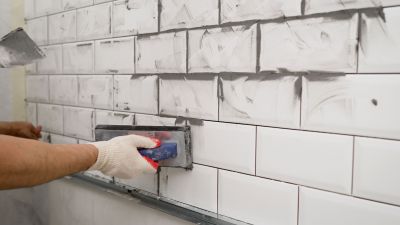Top Choices for Grout Installation Equipment and Supplies
Identify the most effective tools and materials that help achieve durable and visually appealing grout work.
 Products for grout installations encompass a wide variety of tools and materials designed to facilitate the effective application, sealing, and maintenance of grout in tile projects. Proper grout application is essential for ensuring the durability and aesthetic appeal of tiled surfaces, whether in flooring, walls, or countertops. A comprehensive understanding of the available products can help users select the right tools for their specific needs, ensuring a professional finish.
Products for grout installations encompass a wide variety of tools and materials designed to facilitate the effective application, sealing, and maintenance of grout in tile projects. Proper grout application is essential for ensuring the durability and aesthetic appeal of tiled surfaces, whether in flooring, walls, or countertops. A comprehensive understanding of the available products can help users select the right tools for their specific needs, ensuring a professional finish.
Types of Products For Grout Installations
Grout Trowels
Used for spreading and shaping grout, available in various sizes for different tile projects.
Grout Floats
Designed to press grout into joints and smooth the surface for a uniform finish.
Mixing Buckets
Essential for preparing consistent grout mixtures before application.
Grout Sponges
Used for cleaning excess grout and smoothing joints during installation.
Sealing Sealants
Applied after grout curing to prevent moisture and stain penetration.
Grout Cleaners
Specialized solutions for removing grout haze and stains post-installation.
Epoxy Grout
A durable, chemical-resistant grout option suitable for high-moisture areas.
Cement-Based Grout
Traditional grout material that is easy to work with and widely used.
Grout Colorants
Used to change or enhance the color of existing grout for aesthetic purposes.
Grout Repair Kits
Contain tools and compounds for fixing cracked or damaged grout joints.
Flexible Grout Additives
Improve grout flexibility and adhesion, especially for surfaces prone to movement.
Pre-Mixed Grout
Ready-to-use grout for quick application, suitable for small projects.
Grout Rakes
Tools for removing old or damaged grout before reinstallation.
Grout Spatulas
Small, precise tools for detailed grout work and touch-ups.
Anti-Microbial Grout Additives
Help inhibit mold and bacterial growth in grout joints.
Popular Choices
Ideal for spreading grout evenly across large tile surfaces.
Provides a protective barrier to prevent moisture and stains.
Facilitate faster curing times for time-sensitive projects.
Designed for comfortable handling during extended use.
Allow for detailed work and tight joints.
Effective for removing old grout or excess material.
Help maintain the original grout color while protecting it.
Used for applying sealants and adhesives with precision.
Popular for high-traffic or moisture-prone areas due to durability.
Assist in achieving a clean, professional look after installation.
Essential for smoothing and cleaning during the process.
Convenient for quick touch-ups and minor fixes.
Accommodate movement in tiled surfaces and prevent cracking.
Enhance grout longevity by reducing microbial growth.
From initial mixing and application to sealing and cleaning, each stage of grout installation requires specialized products. High-quality grout trowels and spreaders enable precise application, while grout floats help achieve an even, smooth finish. Once the grout is set, sealants protect against moisture and stains, prolonging the lifespan of the tiled surface. Maintenance products, such as cleaning solutions and touch-up kits, also play an important role in preserving the integrity and appearance of grout over time.
Choosing the right products depends on various factors including the type of tile, the location of installation, and personal preferences for ease of use. For instance, epoxy grout may require different tools compared to cement-based grout, and certain sealants are better suited for high-moisture environments like bathrooms or kitchens. Investing in quality tools and materials can lead to more consistent results and reduce the need for costly repairs or reapplications in the future.
Key Buying Considerations
- Type of grout suitable for your project (epoxy vs cement-based).
- Compatibility of tools with tile material and surface conditions.
- Ease of mixing and applying the product for your skill level.
- Durability and resistance to moisture, stains, and cracking.
- Ease of cleaning and maintenance after installation.
- Sealing requirements and compatibility with grout type.
- Working time and curing time to fit project schedule.
- Ergonomics and comfort of tools for extended use.
- Size and weight of tools for maneuverability.
- Color options and ability to match or customize grout color.
- Environmental conditions of the installation area (humidity, temperature).
- Budget constraints and cost-effectiveness of the products.
- Availability of replacement parts or additional accessories.
- Brand reputation and user reviews for reliability.
- Compatibility with existing tiles and surfaces.
